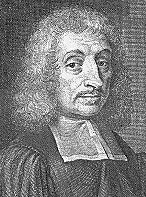Arnold Geulincx facts for kids
Arnold Geulincx (born January 31, 1624 – died November 1669) was a philosopher from Flanders. He was also known by his pen name, Philaretus. Geulincx studied deep questions about life and logic. He was one of the thinkers who followed the ideas of another famous philosopher, René Descartes. Geulincx tried to explain Descartes' philosophy in more detail. A famous writer named Samuel Beckett was inspired by Geulincx's ideas about how humans sometimes feel powerless or don't know everything.
Contents
Life Story
Geulincx was born in Antwerp. He studied philosophy and religion at the Old University of Leuven. In 1646, he became a professor of philosophy there. In 1658, he lost his job, perhaps because of his beliefs or his marriage that year.
In September 1658, Geulincx became a medical doctor. He then moved to the University of Leiden in the Netherlands and changed his religion to Calvinism. At first, he taught philosophy privately. He was later hired as a lecturer in logic in 1662. By 1665, he became a special professor. Before 1662, Geulincx didn't have much money. He died in Leiden in November 1669. Most of his writings, which were all in Latin, were published after he died. His friend, Cornelis Bontekoe, helped edit them.
Geulincx's Philosophy
Geulincx summed up his philosophy with a Latin phrase: "ita est, ergo ita sit", which means "it exists, therefore it is so."
Mind and Body Connection
He believed in something called "pre-established harmony." This was his way of explaining the mind–body problem. This problem asks how our thoughts (mind) and our physical actions (body) work together. Geulincx thought that God set up the mind and body to work perfectly together, like two clocks that always show the same time without actually affecting each other. He died 25 years before another philosopher, Gottfried Wilhelm Leibniz, came up with a similar idea.
Occasionalism and Our Actions
Geulincx also developed a philosophy called occasionalism. This idea helps explain how God is involved in everything. He believed that humans don't actually cause their own actions directly. Instead, when we want to do something, like move our arm, God is the one who makes our arm move at that exact moment. It's like God is the "occasion" for the action.
He explained this with a rule: "quod nescis quo modo fiat, non facis", meaning "if you do not know how a thing is done, then you do not do it." For example, we don't know exactly how our brain sends signals to our muscles to make them move. Because we don't know the exact process, Geulincx believed we aren't truly the ones causing the movement. He thought that God is the one who sees and knows everything, and God is the one who makes things happen.
Humility and Desire
Geulincx thought that humility was very important. He believed that we should understand our place in the world and our relationship with God. He said that we should only desire things that we can actually do. His guiding principle was: "Where you can do nothing, there also you should desire nothing." This idea led him to believe that we should not want things that are beyond our control.
His Writings
All of Geulincx's works were published in Latin. Here are some that came out during his lifetime:
- Quaestiones Quodlibeticae (1653)
- Disputatio medica inauguralis de febribus (1658)
- Logica fundamentis suis restituta (1662)
- Methodus inveniendi argumenta (1663)
- De virtute (1665)
After he died, his longer work, Ethica (Ethics), was published in six parts.
You can also find English versions of some of his works:
- Metaphysics, translated by Martin Wilson, 1999.
- Ethics, translated by Martin Wilson, 2006.
His Influence
Arnold Geulincx's ideas influenced other thinkers and writers.
- The famous writer Samuel Beckett mentioned Geulincx in his books, like Murphy and Molloy. Beckett often repeated Geulincx's gloomy saying: "Ubi nihil vales, ibi nihil velis", which means "Where you are worth nothing, there you should want nothing."
- Another philosopher, Nietzsche, also mentioned Geulincx's ideas about self-disregard in his book Genealogy of Morals.
- A quote from Geulincx's Ethics, "In hoc mundo me extra me nihil agere posse" (meaning "In this world I can do nothing outside myself"), was used as the main idea for A.G. Mojtabai's novel Mundome (1974).
See Also
 In Spanish: Arnold Geulincx para niños
In Spanish: Arnold Geulincx para niños
 | James Van Der Zee |
 | Alma Thomas |
 | Ellis Wilson |
 | Margaret Taylor-Burroughs |


